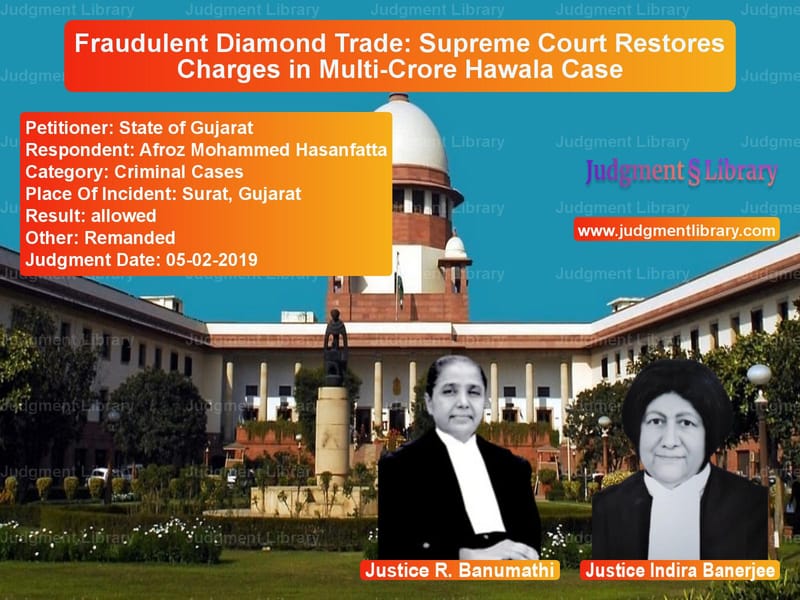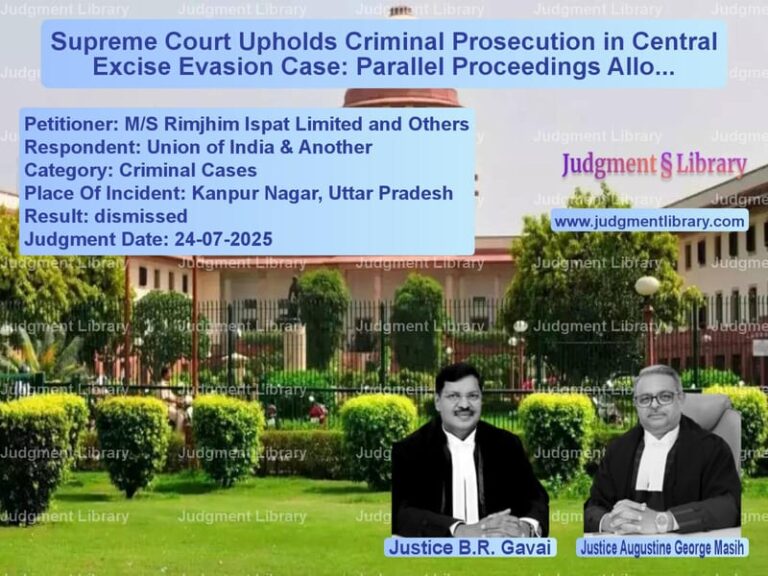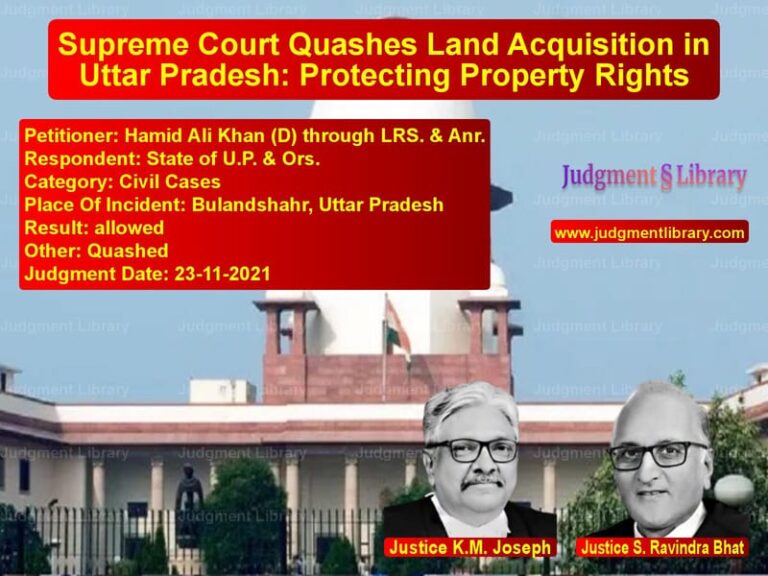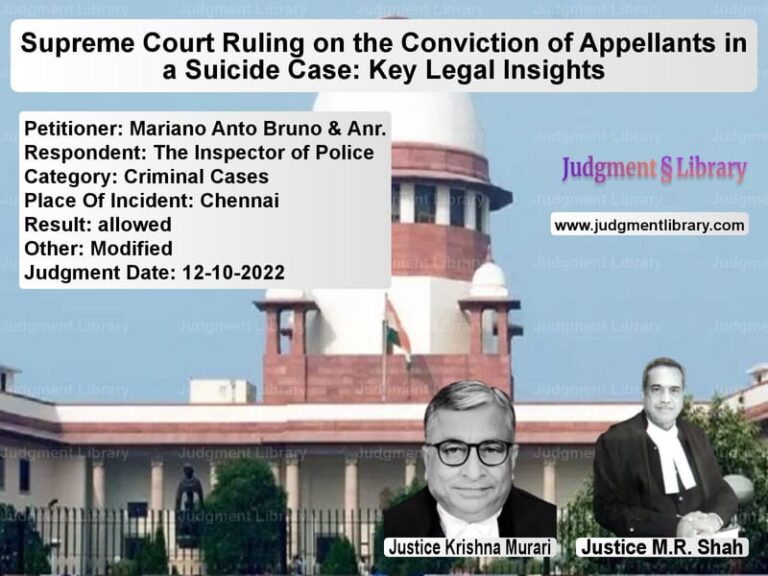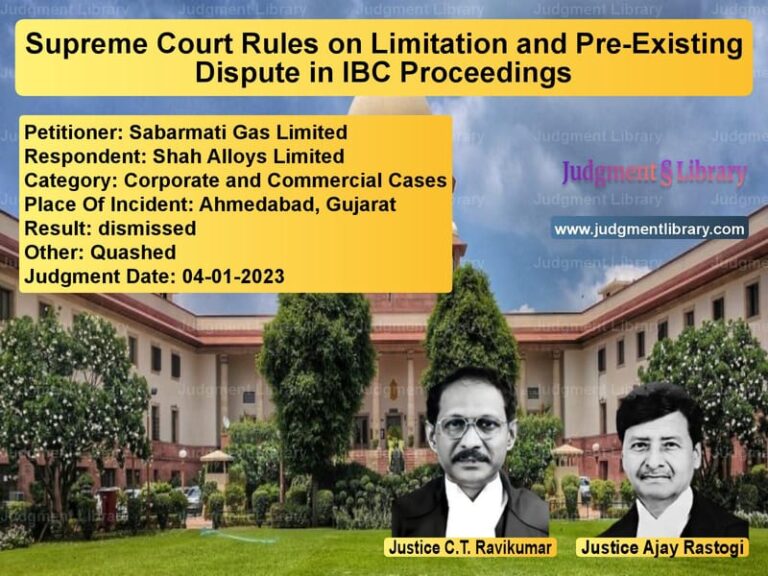Fraudulent Diamond Trade: Supreme Court Restores Charges in Multi-Crore Hawala Case
The case of State of Gujarat vs. Afroz Mohammed Hasanfatta revolves around a large-scale financial fraud involving forged documents, illegal remittance of funds through hawala transactions, and money laundering. The Supreme Court addressed whether the Gujarat High Court erred in quashing the summons issued to the accused based on a second supplementary charge sheet. The judgment provides clarity on the threshold for issuing summons and the role of courts in assessing prima facie evidence at the pre-trial stage.
Background of the Case
The case began when the Manager of ICICI Bank lodged a complaint against M/s R.A. Distributors Pvt. Ltd., alleging that the company engaged in fraudulent activities under the guise of importing rough and polished diamonds. The complaint alleged:
- The accused conspired to open a current account with ICICI Bank on 13.12.2013 by presenting false information about their business operations.
- They submitted 17 fabricated Bills of Entry, fraudulently representing them as genuine customs documents.
- Using these forged documents, they illegally transferred Rs. 104.6 crores through hawala transactions to companies based in Dubai and Hong Kong.
- The transferred funds were funneled through six entities, namely: Mabrook Trading FZE, Nippon Incorporation Ltd, Cornell Trading (HK) Ltd, Al Almas FZE Ltd, S. Al Saba General Trading FZE, and Daimur Gems Jewellery (LLC) Ltd.
On 11.04.2014, the Gujarat police registered FIR No.16/2014 against M/s R.A. Distributors Pvt. Ltd. and its directors under Sections 420, 465, 467, 468, 471, 477A, and 120B of the Indian Penal Code (IPC). Initially, the FIR did not include the respondent, Afroz Mohammed Hasanfatta.
Petitioner’s Arguments
The State of Gujarat, represented by the prosecution, contended:
- The Chief Judicial Magistrate (CJM) had rightly issued summons after taking cognizance of the second supplementary charge sheet, which contained additional evidence implicating the respondent.
- The High Court erred in quashing the summons as it amounted to an interference with the prosecution’s case at a premature stage.
- The accused played a key role in organizing the fraudulent transactions by acting as a facilitator in the illegal transfer of funds.
- The High Court wrongly concluded that there was no direct or circumstantial evidence linking the accused to the crime.
- Summoning an accused does not require a detailed analysis of the evidence but only a prima facie satisfaction of sufficient grounds for proceedings.
Respondent’s Arguments
Afroz Mohammed Hasanfatta, the respondent, through his defense counsel, argued:
- There was no material evidence directly linking him to the fraudulent transactions.
- The prosecution failed to establish his role in submitting forged documents to the bank or his involvement in hawala transactions.
- The statements relied upon by the prosecution, particularly that of Praful Patel, were hearsay and lacked evidentiary value.
- The trial court failed to apply its mind when issuing summons and did not record any reasons for taking cognizance.
- The High Court correctly exercised its revisional jurisdiction to quash the summons, as the prosecution had failed to establish a prima facie case.
Supreme Court’s Observations
The Supreme Court analyzed whether the High Court was justified in interfering with the trial court’s decision to issue summons. The Court made the following key observations:
“The Magistrate, at the stage of issuing summons, is only required to satisfy himself that there are sufficient grounds for proceeding against the accused. It is not necessary for the Magistrate to explicitly state reasons while taking cognizance based on a police report.”
On the issue of evidentiary value, the Court noted:
“Whether the statement of a witness is hearsay or admissible evidence is a matter to be decided at trial. The High Court erred in examining the evidentiary value of statements at the pre-trial stage.”
The Court also emphasized the seriousness of economic offenses:
“Cases involving large-scale financial frauds and hawala transactions affect the economic stability of the country. Courts should adopt a cautious approach before interfering in such cases at the preliminary stage.”
Final Judgment
The Supreme Court ruled:
- The order of the Gujarat High Court quashing the summons was erroneous and was set aside.
- The summons issued by the Chief Judicial Magistrate, Surat, was restored, requiring the accused to face trial.
- The High Court exceeded its jurisdiction by evaluating the merits of the evidence at the pre-trial stage.
- The accused is required to appear before the trial court and contest the charges based on the evidence presented during the trial.
Conclusion
This judgment reinforces the principle that at the stage of issuing summons, courts should only determine whether a prima facie case exists and not conduct a detailed examination of the evidence. The ruling ensures that economic offenses involving large-scale fraud and hawala transactions are subjected to proper judicial scrutiny and that accused persons cannot evade trial by seeking premature relief. The Supreme Court’s decision upholds the rule of law and strengthens the legal framework for addressing financial crimes.
Petitioner Name: State of Gujarat.Respondent Name: Afroz Mohammed Hasanfatta.Judgment By: Justice R. Banumathi, Justice Indira Banerjee.Place Of Incident: Surat, Gujarat.Judgment Date: 05-02-2019.
Don’t miss out on the full details! Download the complete judgment in PDF format below and gain valuable insights instantly!
Download Judgment: State of Gujarat vs Afroz Mohammed Hasan Supreme Court of India Judgment Dated 05-02-2019.pdf
Direct Downlaod Judgment: Direct downlaod this Judgment
See all petitions in Money Laundering Cases
See all petitions in Fraud and Forgery
See all petitions in Judgment by R. Banumathi
See all petitions in Judgment by Indira Banerjee
See all petitions in allowed
See all petitions in Remanded
See all petitions in supreme court of India judgments February 2019
See all petitions in 2019 judgments
See all posts in Criminal Cases Category
See all allowed petitions in Criminal Cases Category
See all Dismissed petitions in Criminal Cases Category
See all partially allowed petitions in Criminal Cases Category

